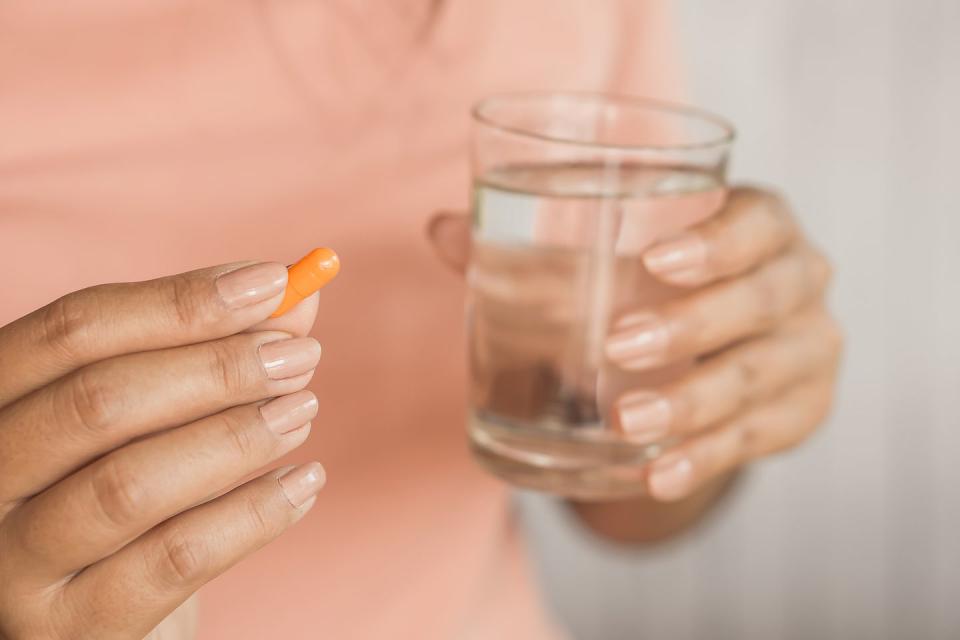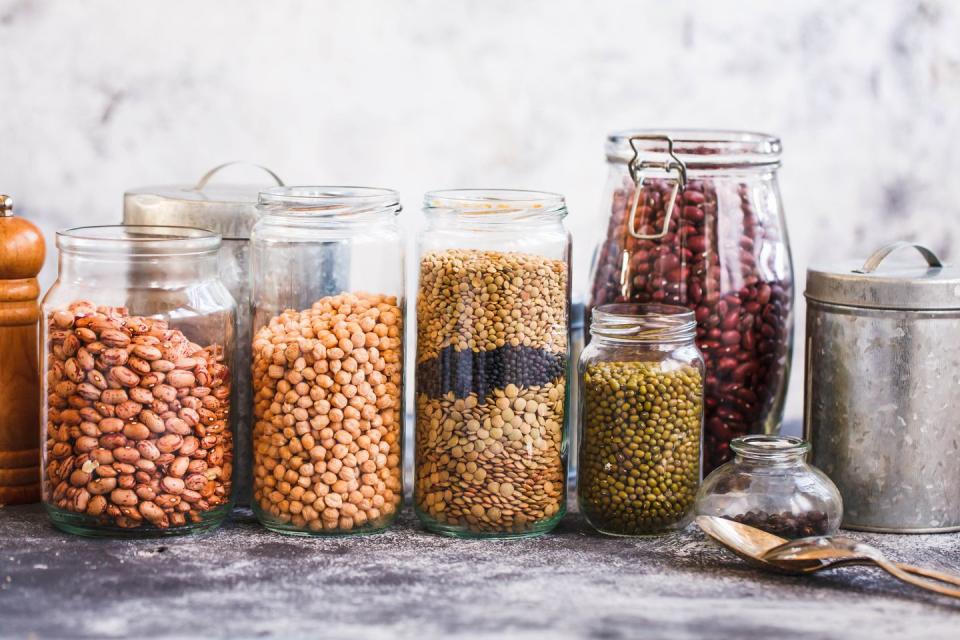This Is Exactly What Probiotics Do to Your Body

These days, probiotics seem to be everywhere - touted in the soft-serve at your local fro-yo joint and the kimchi on your fancy-schmancy sandwich. But unlike with some other nutritional trends, there's solid research confirming probiotics' benefits. "We all live on a bandwidth of health," says Colin Hill, Ph.D., president of the International Scientific Association for Probiotics and Prebiotics. "Probiotics can shift you in the right direction or delay a progression in the wrong direction, especially if you take them prophylactically." In other words, this is one bandwagon worth jumping on.
What are probiotics?
To put it simply, probiotics are live microorganisms, such as strains of bacteria, that in adequate amounts, give you a health benefit. They can be developed and grown in a lab and put in pills, powder, or other products. They also occur naturally in some fermented foods and drinks. When probiotics are present in your gut, they act like peacekeepers, helping to restore order and keep things humming. And scientists are finding that using probiotics to tinker with the gut's bacteria balance may offer a new way of keeping people healthy.

What do probiotics do to your body?
They take up temporary residence in your gut. Probiotics don't move in permanently - you have to keep consuming them for maximum benefits. It requires about five days of habitual ingestion for probiotics to build up a presence, says Daniel J. Merenstein, M.D., a probiotics expert and an associate professor of family medicine at Georgetown University. (Taking them in less frequently may help a little.)
They suss out the environment. Probiotics are smart. "Some of the ones that help with diarrhea also help with constipation. We think they go in, figure out what's needed and respond by either down-regulating inflammation or up-regulating your immune response," says Gregor Reid, Ph.D., director of the Canadian Research & Development Centre for Probiotics.
They negotiate with "terrorists." Most pathogens don't want to do real harm; they're happy to just eat and hang out. In layman's terms, probiotics might say, "We'll let you live, but you can't release your toxin." Then they might produce compounds that prevent a toxin's release, rendering bad bugs harmless, Reid says.
They improve the gut's barrier. "In your gut, only one layer of cells stands between you and death," Reid says. Although dramatic, that accurately describes your GI tract's ultra-thin barrier, which allows nutrients from food to pass through and repels toxins. If that barrier is disrupted, pathogens could enter your bloodstream, making you very sick. Probiotics tighten the binding between cells and may stimulate mucus production, shoring up the barrier and making it difficult for problematic bugs to wreak havoc.
They clean up the slime. "In the case of an infection, bacteria often create a biofilm, which is like the slime that builds up on the underside of a boat," Reid says. "Certain probiotics produce a soap-like material that breaks up that film."
They starve out pathogens. Since they compete with the bad guys for food, probiotics keep harmful bacteria in check by making it hard for them to thrive.
What are the benefits of probiotics?
Two of the biggest reasons to consume probiotics are to prevent or manage GI issues and to lower your odds of catching a bug. "If you're traveling or stressed, or not eating or sleeping well, that's when you'll notice that probiotics really work," Dr. Merenstein says. But newer research suggests that probiotics also have the potential to help prevent or treat other conditions, such as high cholesterol, allergies, and even anxiety. Probiotics have such far-reaching effects because your gut does, too: It houses more nerve endings than any place in the body (besides the brain), and it's ground zero for your immune system's function.
As you may know, to build a strong immune system, people need exposure to a wide variety of microorganisms, something modern-day Americans don't typically get. Plus, we use antimicrobials - found in some soaps and even toothpaste - that kill good bacteria as well as bad. Probiotics may fill the gap, says Hill.

Do probiotics have side effects?
Probiotics may increase bloating, gas, or a change in bowel movements depending on the strain and your personal response to it.
Nearly everyone can take probiotics, but if you have a digestive disorder such as celiac disease, talk to a doctor first. Also, check ingredients on the label if you have a food or drug allergy to minimize your risk of a reaction.
Do probiotics help with weight loss?
No single food or supplement the can help you lose weight, period. But with that in mind, the study of probiotics and obesity looks promising, though the specific link not entirely clear. Dietary factors that can lead to weight gain over time may also affect your gut microbiome. Some developing areas of research are also looking at the relationship of gut bacteria to appetite hormones and calorie absorption, but it's too soon to make any definitive statements just yet.
What are probiotic foods?
You can consume probiotics from fermented foods and drinks (miso, tempeh, sauerkraut, kimchi, kombucha) and dairy products (yogurt, kefir, fermented milk, some cheeses). Look for at least five strains of live and active cultures on the ingredients’ list, but skip the more processed foods that claim to contain probiotics, like sugary beverages or even candy. Unsweetened Greek yogurt has the benefit of providing both a variety of cultures and filling protein.

Should I take a probiotic supplement?
Focus on probiotic foods first in order to reap potentials benefits without any risks. The FDA does not oversee dietary supplements, meaning there’s no guarantee that you’re getting the probiotics you paid for. A lot of research on probiotic supplements also indicates the effects depend highly on your genetic makeup and the composition of your gut bacteria. In other words: The results are super individualized.
Check with your doc before taking any new supplement, including probiotics. You may want to add one in certain situations, like when a stomach bug or antibiotic medications wipe out your GI bacteria (both good and bad).
If you do decide to take probiotic supplement, here's how to get the most out of it:
Take it correctly. Follow storage guidelines to a T; some need to be refrigerated.
Make it a daily habit. If you don't take probiotics continually, the bacteria will leave your system. Aim to take them at least five days a week.
Add dairy. Delivering the good bugs with food helps keep them alive on the trip through your stomach. Yogurt, milk, and cheese in particular neutralize stomach acid and bile acid, increasing the probability that probiotics will reach the intestines.
Go for quality over quantity. A product with 10 different strains isn't necessarily superior to others with fewer, Reid says. You're better off with one strain in a formula that's been tested.
Be a brand snob. Vet products at ConsumerLab.com. One report from the site found that five of the 19 products tested had only a fraction of the promised live bacteria.
Stay the course. It takes four to five days for probiotic levels to build up in your system, so don't expect instant results. If you're taking them for GI issues, it could be as long as three weeks before you feel a difference.

What are prebiotics?
These aren't bacteria at all, but rather naturally-occurring soluble fibers (such as inulin and oligofructose) that feed the good bacteria already living in your gut, helping them survive and thrive. You can find them in 100% whole grains, various fruits, artichokes, asparagus, onions, shallots, garlic, leeks, legumes, beans, chickpeas, and lentils. Eating more of these foods may also reduce our risk of chronic diseases, including heart disease, some cancers, and type II diabetes.
('You Might Also Like',)
